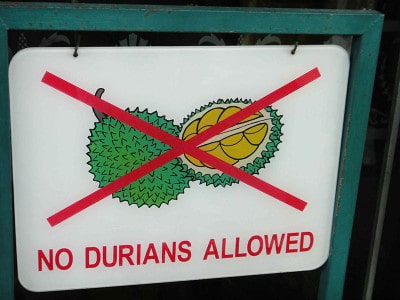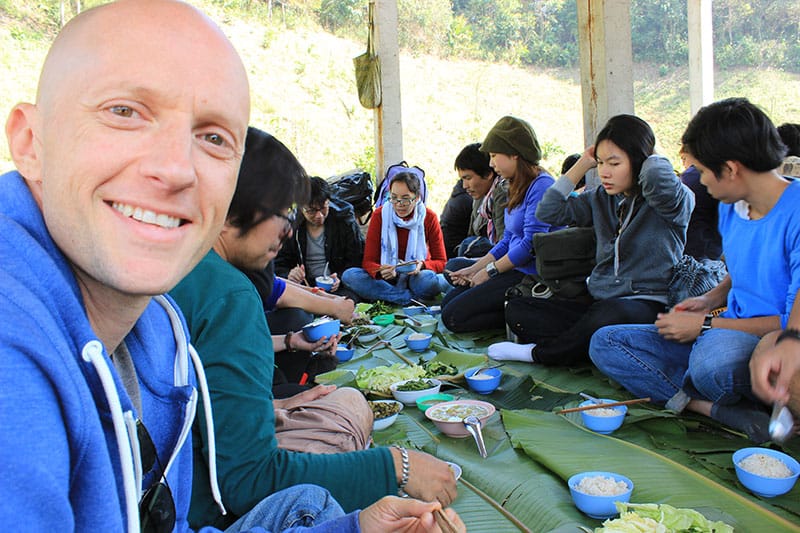For nine months in 2013-2014, I lived in Chiang, Mai, and traveled around Thailand.
Thailand truly is a magical place full of friendly smiling faces, stunning sites, and flavors so fresh and so delicious that you wish you could box them up and keep them forever.
But you can’t, and you shouldn’t, and I’ll explain why in a minute.
So what are the top 3 things I learned about health while living in Thailand?
#1 The importance of variety in foods
Thai food is complex.
A large variety of spices, herbs, vegetables, and cooking techniques are used to create the vast repertoire that is Thai cuisine.
Thai curry paste, for example, contains 12+ ingredients and some major time and elbow grease to make it fresh. So very rarely do people make it themselves.
Thai people will often have their favorite market vendor who has dedicated their whole life to perfecting just one food item. They take pride in the freshness of their ingredients. And you can taste it.
I learned to eat things while in Thailand that I have never seen before. And partly because some of it does not ship well.
Take Durian for example. The Durian may just be the stinkiest and weirdest fruit on the planet. It tastes of rotten custard and stinky gym socks. Yum yum.
It is common to see signs of Durian with a big X across them, indicating that Durian is not allowed in this building, in this room, or on this flight. Why? Just wait until you smell if for the first time and you’ll know why!
Yet, when Durian season rolls around, it is eaten like it’s going out of style.
The good news is you don’t have to eat Durian to be healthy, but you SHOULD keep an open mind about continually trying new foods. It can take children 8+ times of being introduced a certain food before they decide that they like it. Being introduced to a variety of tastes is very important for your child’s development and their future relationship with food. Don’t give up too early.
Have you ever cooked with galangal or kaffir lime leaf? What about fish sauce?
These 3 ingredients are responsible for a lot of the flavors that we associate with Thai food.
Eating a variety of foods keeps food interesting. You should love what you are eating. Food is life and it should be fun. I think you don’t fully experience a culture until you eat their food.
Tip: Fish sauce often contains gluten, MSG, and preservatives. I recommend giving this one a try.
One easy way add variety and make your food more interesting: cook with fresh herbs!
Add fresh-cut basil to the top of your morning eggs, drop some chopped oregano into your tomato sauce, sprinkle fresh rosemary on chicken before you bake it, or add fresh parsley on top of stir fry.
It’s really that easy. Just chop and add to everything. Voila! Your food is more sexy and nutritious.
#2 Eat smaller meals
Studies suggest that people who eat less live longer.
For New Year’s this year, I was given the opportunity to go on a tour of a coffee plantation. Me, my fiancé, and 50 Thai people. We traveled to a remote village, slept in the villagers’ huts, and ate from their kitchens. At night we would all eat family style. With a small bowl in hand, 6+ various meat and vegetable dishes would be passed around. It is considered rude to add more than one dish to your bowl at a time. So you eat a small amount and move on to the next.
So what does this do? It slows you down. No scarfing food down so fast that you don’t know you’ve overeaten until it’s too late.
When you eat slowly, you naturally eat less.
Restaurants also commonly serve on small plates and much smaller portions than what we are used to.
The take-home message is to make a conscious effort to eat slowly, eat on smaller plates, and eat enough to be satiated but not enough to be stuffed.
#3 The art of dining out (for every meal)
To my surprise, I discovered that Thai apartments are typically without kitchens!
Some have a tiny refrigerator or small hot plate, but it is the rare Thai apartment that has a full kitchen and oven.
The food is very cheap. And it is often cheaper to eat out than in.
There are food stalls on nearly every street and street corner.
So learning to eat like a local means dining out for literally every meal.
For the first six months, I fried a total of 2 eggs in my kitchen and fully embraced this lifestyle of having what felt to me like a personal chef.
Thai people also dine out because the food is the best when eaten immediately. Put that doggie bag away because it doesn’t make for very good leftovers. That is what I meant when I said you should not box up your food.
The spices and herbs are the best when fresh, and some do not taste the same once they have been shipped over far distances.
Now, I would not recommend that you start eating out for every meal. It is important to know how to cook and to know the quality of food that is going in to what you eat. However, it is also important to know how to dine out and still make healthy choices. It just takes practice.
Here are some substitutions that I commonly make:
Alcohol = mineral water with lemon or grapefruit
Mexican = sub the flour tortilla for corn, or get rid of the tortilla/chips all together, add a side of guacamole to everything
Thai = order curry and salads, skip the rice
Italian = order the antipasto, grilled veggies, meats and tomato based sauces, skip the pasta and bread
Sandwich/burger shop = take off the bread, ask for it wrapped in lettuce, or make a lettuce bowl topped with guacamole/salsa/pesto etc.
…
Here are 3 things I could definitely do without in Thai cooking.
#1 All the sugar
The Thai people LOVE to sweeten everything- either with cane sugar, or more traditionally palm sugar. Sometimes this results in very sweet unpalatable dishes. Their drinks are especially sweet!
We developed the phrase, “I’ve been sugared,”while in Thailand, which meant we forgot to request something without added sugar.
#2 Added MSG (monosodium glutamate)
Added MSG is definitely in a lot of their sauces, including their staple, fish sauce. And it is often sprinkled on top of dishes to give them a boost in umami flavor. And boy does it. We also learned to ask for no added MSG when possible.
#3 Vegetable oil
Unfortunately, due to cost, traditional oils such as coconut and palm have been abandoned for the unhealthy alternative, vegetable oil, which is high in omega-6 fatty acids. So eating lots of fresh sea food and taking a fish oil supplement became very important to boost intake of omega-3 oils.
In spite of the strange looks you receive when you ask a Thai cook to alter a dish that they have been making in their family for centuries, eating in Thailand has given me some of my favorite experiences to date. It has certainly expanded my palate to include many new mouthwatering tastes.
Although the true flavors of Thai cooking are best experienced in Thailand, you can still do a pretty good job at home.
Here are 3 Thai (ish) dishes that you should definitely learn to make:
Papaya salad
Try this one from Stupid Easy Paleo
2. Green curry
Try this one from Nom Nom Paleo
3. Larb
Try this one from Paleo Comfort Foods
…
Have a favorite Thai recipe? I’d love for you to share it below!
What lessons have you learned about health from your travels???



2 replies to "Three things I learned about health while living in Thailand"
I just heard your and your partner’s part on Johnny FD’s podcast. Sounds like you guys had a great time in Thailand! Best of luck with your businesses!
Loved reading this and hearing about your experiences in Thailand! Very inspiring Dr. Alexis!